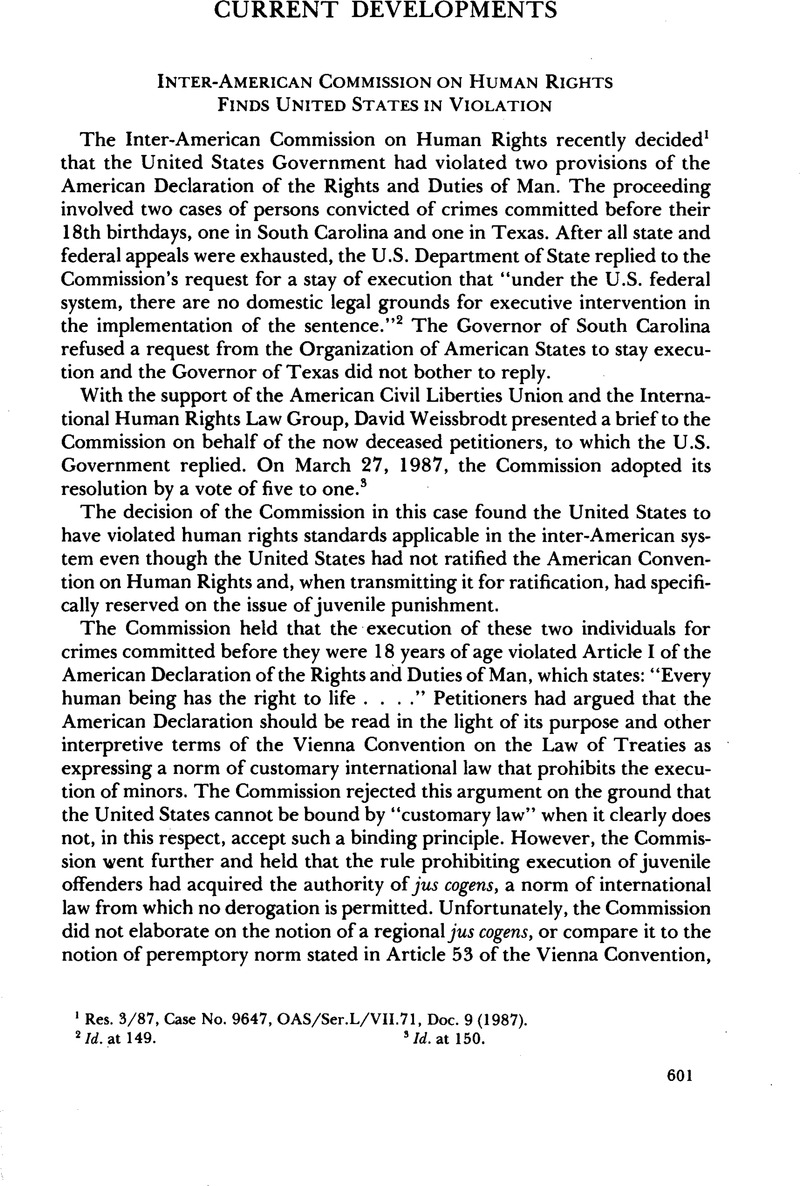Article contents
Inter-American Commission on Human Rights Finds United States in Violation
Published online by Cambridge University Press: 27 February 2017
Abstract

- Type
- Current Developments
- Information
- Copyright
- Copyright © American Society of International Law 1988
References
1 Res. 3/87, Case No. 9647, OAS/Ser.L/VII.71, Doc. 9 (1987).
2 Id. at 149.
3 Id. at 150.
4 Res. XXX, 6 Ninth International Conference of American States, ACT AS Y Documentos 297 (1953) [hereinafter Declaration]; see Fox, , The Protection of Human Rights in the Americas, 7 Colum. J. Transnat’l L. 222 (1968)Google Scholar.
5 On the evolution of the concept of the binding character of the Declaration, see Buergenthal, , The Revised OAS Charter and the Protection of Human Rights, 69 AJIL 828 (1975)CrossRefGoogle Scholar.
6 OAS/Ser.L/V/I.1 (Sept. 26, 1960).
7 Res. XXII of the Second Special Inter-American Conference, OAS/Ser.L/V/II.14, Doc. 33 (1966); see Fox, , Doctrinal Development in the Americas: From Non-intervention to Collective Support for Human Rights, 1 N.Y.U. J. Int’l L. & Pol. 44, 55 (1968)Google Scholar.
8 Gregg v. Georgia, 428 U.S. 153 (1976). On June 27, 1988, the Supreme Court decided (5–3) that at least minors under the age of 16 at the date of the crime could not be executed under state laws that did not set a minimum age. Four members of the majority concurred that “evolving standards of decency” would make the execution of such persons unconstitutional. Thompson v. Oklahoma, N.Y. Times, June 30, 1988, at A17, col. 1 (U.S. June 29, 1988) (No. 86–6169). In its October 1988 term, the Court will determine whether capital punishment of minors violates the constitutional ban on cruel and unusual punishment (High v. Zant, No. 87-5666; Wilkins v. Missouri, No. 87–6026). This Eighth Amendment ban is not as broad as Article XXVI of the American Declaration forbidding cruel, infamous or unusual punishment.
9 Res. VIII, Fifth Meeting of Consultation of Ministers of Foreign Affairs, Final Act, OEA/S.C/II.S (1960).
10 See Fox, , The American Convention on Human Rights and Prospects for United States Ratification, 3 Hum. Rts. 243 (1973)Google Scholar.
- 1
- Cited by




